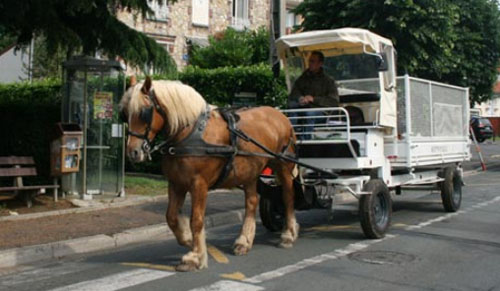The article below is from cleantechnica.com.
When we first switched from horses to horsepower at the turn of the 20th century, the move was hailed as one of modernity, cleanliness and efficiency. After a century during which we’ve discovered that the “auto mobile” brought with it a far more dangerous environmental assault than horse droppings, now more than 60 French towns are once again returning to the old horse-drawn cart, at least for picking up compost for recycling.
Interestingly, in towns that employed horses to pick up the compost, the composting rates have increased measurably.
“By using the horse for garden waste collection, we have raised awareness. People are composting more,” says the mayor of one of the French towns that has succeeded in making the change. It is actually cost effective, cutting costs by almost 60%. “Incineration used to cost us €107 a tonne, ridiculous for burning wet matter, now we only pay €37 to collect and compost the waste.”
Perhaps the increased composting is related to the slower pace of the horse-drawn cart. The sound of the clip clop of the horses hooves is a reminder that “there is no away anymore“. It also is a soothing reminder of a slower pace of life, in which the patience and consideration needed to make recycling compost second nature doesn’t seem so out-of-kilter with today’s frenetic pace.
It doesn’t work everywhere. Some French towns tried the new clean technology, and abandoned it after a few months, due to picking the wrong equipment, the wrong kind of horse (cart-horses are needed to pull carts), untrained workers: inexperienced with horses, or just too many hills. But others have had several years of success now, and outside of France too.
“Compared with €5,000–7,000 annual running costs for a diesel truck, an ass costs €1,000–1,500 and can live 25-30 years,” says the mayor of a 14th-century Sicilian town, who has been using donkeys for three years.
“A truck costs around €25,000, lasts around five years and can’t reproduce.”

